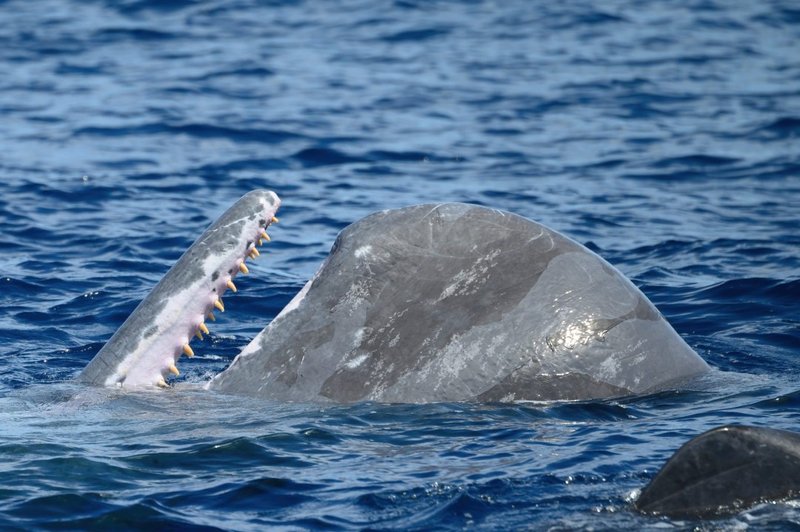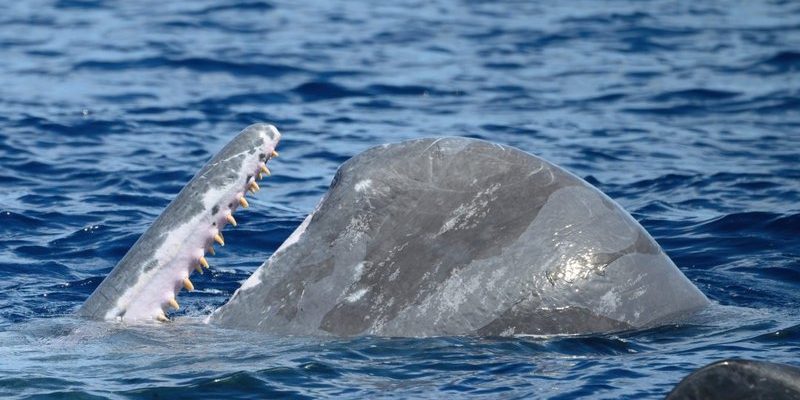
You might be wondering how such a large animal hunts and what it actually eats. Sperm whales are deep divers, capable of plunging over a mile beneath the surface, where they find their favorite meals. They primarily feast on squid, but their diet can include fish and various deep-sea creatures. Let’s dive deeper into understanding the sperm whale’s feeding habits, exploring how they hunt, what they consume, and why it matters.
Understanding Sperm Whale Diet
Sperm whales have a varied diet, but what they primarily consume depends on their age, size, and the regions they inhabit. Squid is at the top of their menu, especially the giant squid, which they pursue in deep waters. Here’s the interesting part: sperm whales are known for their exceptional hunting skills; they can tackle prey that is as large as themselves or even larger!
What you might not realize is that sperm whales have a preference for specific types of squid, such as the elusive *Architeuthis dux*, commonly known as the giant squid. With their enormous heads containing a beak-like structure, they can crush their prey easily. But it’s not just squid; they also enjoy various species of fish, including deep-sea varieties. The adaptability in their diet allows them to thrive in different oceanic environments.
While hunting, sperm whales can consume up to 2,000 pounds of food each day. Just to put that into perspective, that’s about the weight of a small car! This enormous appetite is driven by their massive size, and they need to fuel their bodies with high-energy meals.
How Sperm Whales Hunt
Sperm whales are incredible hunters, using echolocation to locate their prey in deep waters. They emit a series of clicks that bounce off objects in the dark depths of the ocean, allowing them to “see” their surroundings through sound. Think of it as a sonar system—just like how submarines navigate underwater.
When hunting, they can dive as deep as 3,280 feet—that’s nearly a mile! During these deep dives, they can hold their breath for up to 90 minutes. Once they reach the right depth, they start searching for squids and fish. The process can be intense, as they must navigate pitch-black waters where only the hardiest creatures dwell.
Interestingly, sperm whales don’t just hunt alone. They often work together in groups, called pods, to track and capture larger prey. This teamwork can be likened to a well-rehearsed dance, where every member knows its role in bringing down the catch. Their keen social structure enhances their hunting success.
Feeding Techniques of Sperm Whales
When it comes to feeding, sperm whales employ various techniques depending on what they’re hunting. One method involves open-mouth feeding. They swim with their mouths agape, allowing schools of fish to swim right in. It’s almost like throwing yourself into a buffet and grabbing everything at once.
Another technique is called targeted hunting. This is when they actively pursue squid or fish, using their speed to catch them with precision. Their large mouths and strong jaws allow them to grab and hold onto slippery prey. This agility in water makes them formidable opponents to the squids they chase.
Let’s not forget about their remarkable ability to digest their food. Sperm whales have specialized stomachs designed to break down tough, protein-rich meals. When they consume squid, they often chew up the beaks and other hard parts. Eventually, the remnants of their meals can be found in the form of squid beaks in their feces, providing scientists with valuable insights into the whale’s diet.
Impact of Feeding Habits on the Ecosystem
The feeding habits of sperm whales play a significant role in the marine ecosystem. By preying on large squid populations, they help maintain a balance in the ocean’s food web. In simple terms, if there were no sperm whales, squid populations could balloon, leading to overpopulation and depletion of resources.
Moreover, when sperm whales dive deep and feed, they also contribute to nutrient recycling. Their waste, rich in nutrients, sinks to the ocean floor, fertilizing the deep-sea environment. This process supports the growth of phytoplankton, which is crucial for the health of our oceans. Phytoplankton produce more than half of the world’s oxygen—it’s pretty amazing how these whales play a role in that!
Additionally, the presence of sperm whales can indicate the overall health of ocean ecosystems. Researchers study their feeding habits and population dynamics to understand the state of marine biodiversity. It’s a cycle where the health of the whales reflects the health of the oceans, emphasizing the interconnectedness of all marine life.
Challenges to Their Diet
Despite their adaptations, sperm whales face challenges in their feeding habits. Overfishing and changes in deep-sea ecosystems can affect their food sources. As human activities impact marine life, the availability of squid and other prey may decline. This could lead to malnutrition or starvation in some whale populations.
Another issue is climate change, which alters ocean temperatures and currents. Such changes can shift squid habitats, making it difficult for sperm whales to locate their preferred meals. Honestly, it’s a tough situation, and the long-term impacts are still unknown.
Pollution also poses threats, with toxic substances accumulating in the ocean. These contaminants can affect the health of sperm whales, compromise their ability to hunt, and ultimately harm their populations. Conservation efforts are crucial to ensuring the survival of these majestic creatures, but it requires a collective commitment from all of us.
The diet and feeding habits of sperm whales are a testament to their role as apex predators in the ocean. With their impressive hunting skills, they effectively manage populations of squid and fish while also supporting the broader marine ecosystem. Understanding these habits gives us insight into the challenges they face and the importance of their conservation.
As we learn more about these fascinating creatures, it’s crucial to advocate for their protection. Every effort counts, whether it’s reducing pollution, supporting sustainable fishing, or simply educating ourselves and others about the wonders of marine life. After all, the health of our oceans depends not just on the sperm whale but on every living being within it. So, next time you think about these incredible whales, remember their unique diet and the impact it has on the world beneath the waves.

